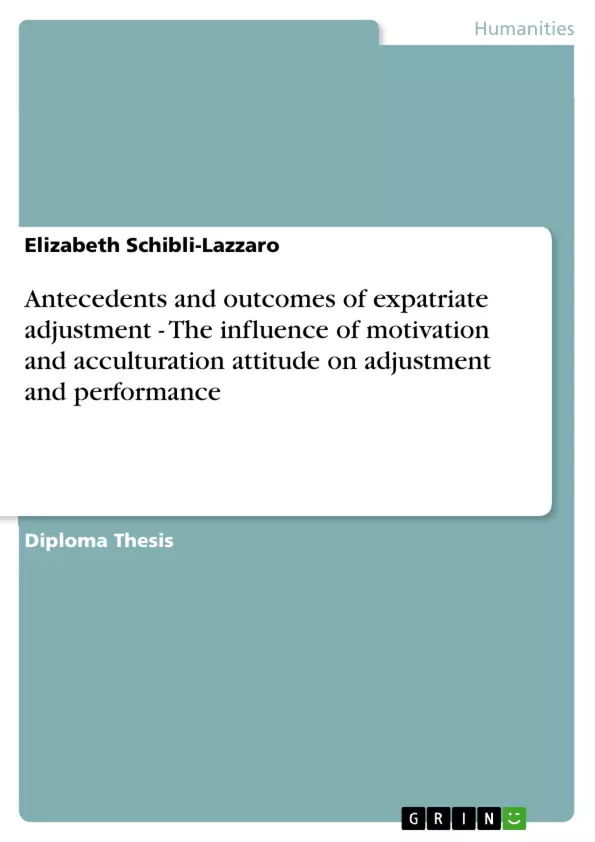This study investigates the antecedents and outcomes of expatriate adjustment on international assignment (IA). 47 expatriates, 25 spouses and 31 supervisors / co-workers assigned to five different countries participated in this survey. In the first part of the study the influence of intrinsic and extrinsic motivation to accept an IA on the acculturation attitude is investigated, and the effects of the acculturation attitude on general, interaction, and work adjustment are examined. Intrinsic motivation is positively related to mainstream culture orientation. Mainstream culture orientation is in turn related to interaction adjustment, but not to general and work adjustment.
The second part of the study explores the influence of expatriate adjustment on strain, task, contextual and adaptive performance and the intention to leave the assignment prematurely. General adjustment was negatively related to strain, while work and spouse adjustment showed a positive relationship to strain. Interaction adjustment was not significantly related to strain. This study found that expatriate and spouse adjustment were not significantly related to any of the three facets of performance. Spouse adjustment and strain were both related to the intention to leave the assignment prematurely.
Table of Contents
- ABSTRACT
- 1. INTRODUCTION
- 2. ANTECEDENTS OF ADJUSTMENT
- 2.1. The concept of Adjustment
- 2.2. The concept of Motivation
- 2.3. The concept of Acculturation
- 3. OUTCOMES OF ADJUSTMENT
- 3.1 Adjustment and Strain
- 3.2. Spouse adjustment
- 3.3. The concept of performance
- 3.4. Performance and Strain
- 3.5. Adjustment and performance
- 4. METHOD
- 4.1 Sample and data collection
- 4.2 Measures
- 4.2.1 Motivation
- 4.2.2 Acculturation attitude
- 4.2.3 Adjustment
- 4.2.4 Performance
- 4.2.5 Intention to leave
- 4.2.6 Strain
- 4.2.7 Control variables
- 4.3 Analyses
- 5. Results
- 5.1. Descriptive results
- 5.2 Motivation and Mainstream culture orientation (Hypothesis 1)
- 5.3. Mainstream culture orientation and adjustment (Hypothesis 2)
- 5.4. Acculturation types and adjustment (Hypothesis 3)
- 5.5. Adjustment and strain (Hypothesis 4)
- 5.6. Adjustment, strain and performance (Hypothesis 5)
- 5.7. Strain, spouse adjustment and intention to leave the IA prematurely (H6)
- 6. Discussion
- 6.1. General Discussion
- Motivation
- Acculturation attitude and adjustment
- Adjustment and strain
- Adjustment, strain and performance
- Intention to leave
- Language ability
- 6.2. Limitations
- 6.3. Practical implications
- 6.4. Further research
- 6.5. Conclusion
- 6.1. General Discussion
- Bibliography
- Index of abbreviations
Objectives and Key Themes
This diploma thesis aims to investigate the antecedents and outcomes of expatriate adjustment, focusing specifically on the influence of motivation and acculturation attitude. The study explores the complex relationship between these factors and the adjustment process, performance, and intention to leave the international assignment.
- The concept of adjustment and its determinants
- The role of motivation in expatriate adjustment
- The impact of acculturation attitude on adjustment and performance
- The relationship between adjustment, strain, and performance
- Factors influencing intention to leave an international assignment
Chapter Summaries
Chapter 1 introduces the topic of expatriate adjustment, outlining the research questions and the theoretical framework. Chapter 2 delves into the antecedents of adjustment, exploring the concepts of adjustment, motivation, and acculturation. Chapter 3 examines the outcomes of adjustment, including strain, spouse adjustment, performance, and intention to leave. Chapter 4 provides details on the research methodology, including the sample, data collection procedures, and statistical analyses. Chapter 5 presents the empirical findings of the study, analyzing the relationship between motivational factors, acculturation attitude, adjustment, performance, and intention to leave the international assignment. Chapter 6 offers a comprehensive discussion of the findings, highlighting key insights and implications for future research.
Keywords
This study revolves around key concepts such as expatriate adjustment, motivation, acculturation, performance, strain, intention to leave, and international assignment. The research investigates the influence of motivational factors and acculturation attitude on adjustment and its outcomes, providing valuable insights into the challenges and successes of international assignments.
Frequently Asked Questions
What is the focus of this study on expatriate adjustment?
The study investigates the factors (antecedents) that influence how expatriates adjust to international assignments and the resulting outcomes, such as job performance and the intention to stay or leave.
How does motivation affect the acculturation process?
The research found that intrinsic motivation to accept an international assignment is positively related to a "mainstream culture orientation," which in turn influences interaction adjustment.
What are the different types of adjustment mentioned?
The study distinguishes between three main types: general adjustment, interaction adjustment, and work adjustment.
Does expatriate adjustment directly impact job performance?
According to the findings of this specific study, expatriate and spouse adjustment were not significantly related to the three investigated facets of performance (task, contextual, and adaptive).
What factors influence the intention to leave an assignment early?
The study highlights that both psychological strain and the adjustment of the spouse are key factors related to an expatriate's intention to terminate the assignment prematurely.
- Quote paper
- Dipl.-Psych. Elizabeth Schibli-Lazzaro (Author), 2006, Antecedents and outcomes of expatriate adjustment - The influence of motivation and acculturation attitude on adjustment and performance, Munich, GRIN Verlag, https://www.grin.com/document/84725



